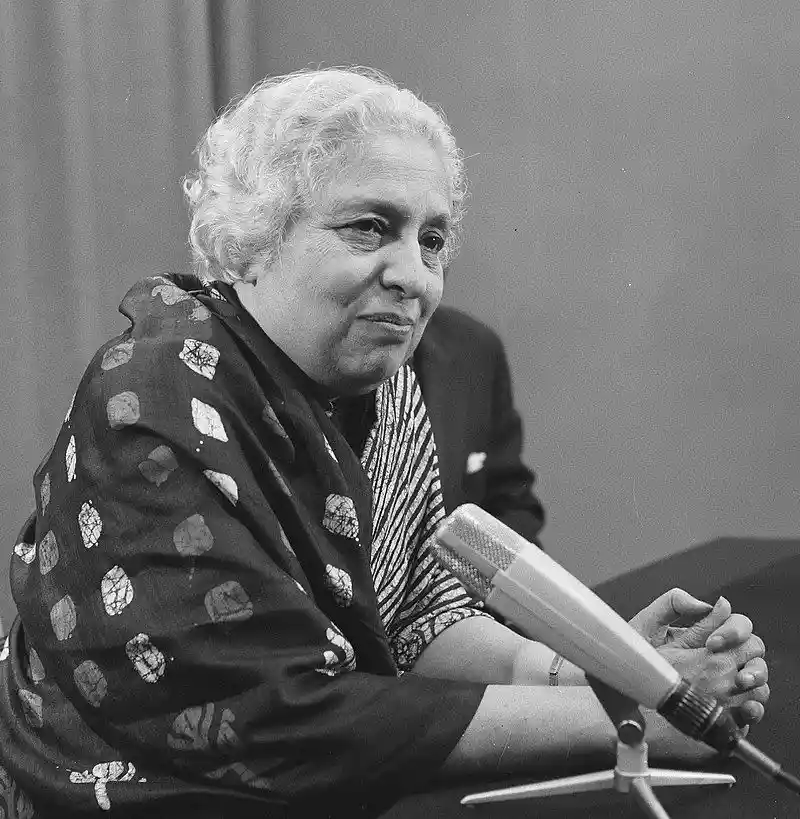International Face of Nehru Legacy Unveiled
Freedom-loving on the inside, revolutionary on the outside, Vijay Lakshmi Pandit is a politician, diplomat, and a freedom fighter who not only became India's first woman cabinet minister but also got imprisoned three times.

Vijay Lakshmi Pandit-The Face of Nation; Image Source: Wikipedia Commons
She arrived in India at the right time of revolution and made it her mission to fight, accomplish, and fulfill her dream of a free nation with prestige and glory. In turn, it is not surprising that she is the younger sister of a well-known figure in Independent India and of the first prime minister, Pandit Jawaharlal Nehru. India has seen her hold numerous leadership positions at various levels, and even representing India abroad.
She was born as Swarupa Kumari Nehru, a Kashmiri Pandit, whose hometown was the North-Western (now Prayagraj) Province of British India. Because she was raised by Moti Lal Nehru and lived in a family of revolutionaries that led the historical Swarajya movement, it is very likely that the same blood vested Lakshmi from her childhood onward.
Later, she came to be known as Vijay Lakshmi Pandit because, in Hindu culture, women change their names once they marry. In a way, this name made history in the struggle that led to India's independence
As the story goes, she married Ranjit Sitaram Pandit, a distinguished lawyer and classical scholar from Maharashtra. Unfortunately, he was arrested when he stood up in defense of the independence movement and died at the hands of British forces in 1944.
Her husband died for the country and left his three daughters to bear the loss, Vijay Lakshmi was born again not only to rebel against the British but also to travel the path of independence.
"One can argue that in the context of history a few years do not matter. But we live in an age in which every moment counts heavily and the price of delay is human lives." —Vijaya Lakshmi Pandit
Despite the fact that she first entered politics in 1937 after being elected to the United Provinces of British India, her activeness grew as she became more vocal about freedom after her husband's death.
As the first woman appointed to the cabinet post for local self-government and public health in British India, she reached the height of her political career and left a mark that lives to this day.
Her career in diplomatic service started immediately after India's liberation from British occupation in 1947. She became India's ambassador to the Soviet Union, the United States, Mexico, Washington, Dublin, Ireland, and Spain. Vijay Lakshmi was a woman with many firsts to her credit. She was also the first Indian woman to be elected as the President of the UN General Assembly and a member of the UN Human Rights Commission. She even served as the Indian High Commissioner in the United Kingdom.
Apart from her involvement in politics, she even published two books: The Evolution of India (1958) and The Scope of Happiness: A Personal Memoir (1979).
After being active in politics for many years, she stepped down in 1977 after her relations with Indira Gandhi soured, and retired from public life gradually.
From the beginning of her career, she established herself as a bold name that stood against everything that was against people. She started from being a member of the Constituent Assembly of the then United Provinces in 1946 and later an elected Governor of Maharashtra and a member of the Lok Sabha. All this while she endured everything from opposition to criticisms with her innate charm and power to win people's trust.
Her message of a just and peaceful world was far from a mere slogan - every word she uttered was an inspiration and a source of great pride. She carried on the Nehru legacy through her personality and always followed the path that uplifted the nation.


